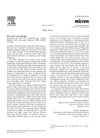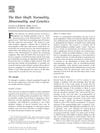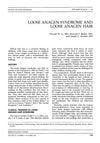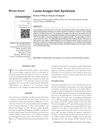Search
for
Sort by
Research
30 / 1000+ results
research Genetics of Structural Hair Disorders
The document concludes that over 500 genes are linked to hair disorders and this knowledge is important for creating new treatments.

research Inherited Disorders of the Hair
The document explains the genetic causes and characteristics of inherited hair disorders.
research Characterization of Human Keratin-Associated Protein 1 Family Members
Mutations in hKAP1 genes may cause hereditary hair disorders.
research An Update of Hair Shaft Disorders
Advances in genetics may lead to targeted treatments for hair disorders.

research Hair Science and Technology
The book "Hair Science and Technology" provides a deep understanding of hair biology and genetics, discusses hair growth, density, and diseases, and offers methods for managing hair loss and caring for hair growth.

research Trichodystrophies: A Hair-Raising Differential Diagnosis
The guide helps doctors diagnose hair problems by suggesting a thorough patient history, physical exams, and various diagnostic tools.

research Congenital Atrichia and Hypotrichosis
The document emphasizes the importance of correctly identifying and classifying genetic hair disorders to help diagnose related health conditions.

research Editors' Picks
Scientists found gene mutations that affect hair loss, skin stem cells, and skin disorders, and identified drugs that may help treat blood vessel and skin conditions.

research Current Genetics in Hair Diseases
Genetic mutations cause various hair diseases, and whole genome sequencing may reveal more about these conditions.

research Biology and Genetics of Hair
The document concludes that understanding the genes and pathways involved in hair growth is crucial for developing treatments for hair diseases.

research Trichoscopy in Hair Shaft Disorders
Trichoscopy is a useful tool for diagnosing hair disorders without pulling out hair.

research To Grow or Not to Grow: Hair Morphogenesis and Human Genetic Hair Disorders
Genetic mutations can cause hair growth disorders by affecting key genes and signaling pathways.

research Hair Disorders
Understanding normal hair growth and loss in children is key to diagnosing and treating hair disorders.

research Clinical and Molecular Genetic Studies in Hereditary Hair Loss
Researchers found a genetic link for hereditary hair loss but need more analysis to identify the exact gene.

research Genetic Hair Disorders: A Review
The conclusion is that genetic testing is important for diagnosing and treating various genetic hair disorders.

research The Hair Shaft: Normality, Abnormality, and Genetics
Hair microscopy is useful for diagnosing hair disorders, but clear definitions are needed for accurate genetic analysis.

research Computational Derivation of a Molecular Framework for Hair Follicle Biology from Disease Genes
The research provides a gene-based framework for hair biology, highlighting the Hippo pathway's importance and suggesting links between hair disorders, cancer pathways, and the immune system.

research Loose Anagen Syndrome And Loose Anagen Hair
Loose Anagen Syndrome causes easy-to-pull, thin hair, mainly in young girls, and improves with age.

research Mutant Laboratory Mice With Abnormalities in Hair Follicle Morphogenesis, Cycling, and Structure: Annotated Tables
Mutant mice help researchers understand hair growth and related genetic factors.

research Diseases of Hair and Nails
The document says that there are treatments for hair and nail diseases.

research Loose Anagen Hair Syndrome
Loose Anagen Syndrome is a hair condition where hairs can be easily pulled out, mainly affecting young girls, and may improve on its own or with treatment.

research Evaluation and Diagnosis of the Hair Loss Patient
To diagnose hair loss, use a systematic approach including history, exams, and tests.

research Molecular Genetics of Alopecias
Scientists have found specific genes linked to different hair loss conditions, which could lead to new treatments.

research Alopecia in Children
Most hair loss in children is caused by a few common conditions and is easy to diagnose, but rare types require careful evaluation.
research Monilethrix of the Scalp from Almost Normal Aspect to Total Alopecia: Variable Intrafamilial Expressiveness
Monilethrix causes different levels of hair loss in family members.
research Development of the Emulsion for the Androgenic Alopecia Treatment
The emulgel with specific ingredients was effective for treating hair loss.

research Uncombable Hair Syndrome and Beyond
Uncombable hair syndrome causes frizzy hair and can affect the nervous system, eyes, and ears, often co-occurring with other hair, skin, nail, and teeth conditions, and is linked to three specific gene mutations.

research Uncombable-Hair Syndrome
Four children had unmanageable pale blond hair due to uncombable-hair syndrome.

research Structural Abnormalities of the Hair Shaft
The document concludes that understanding hair structure is key to diagnosing hair abnormalities and recommends gentle hair care for management.